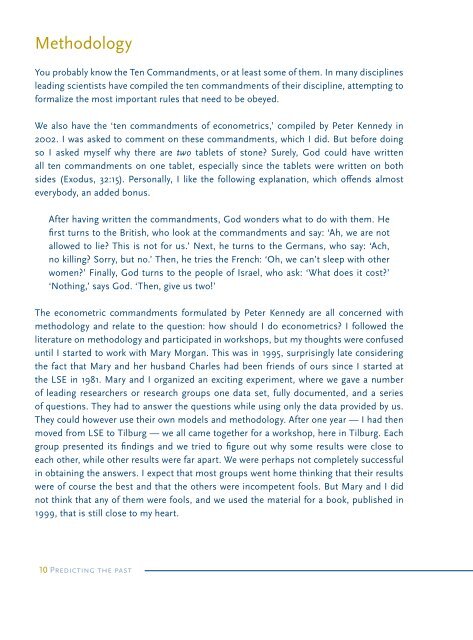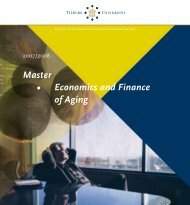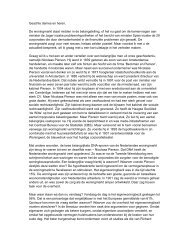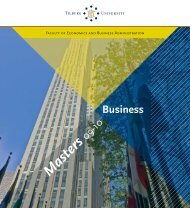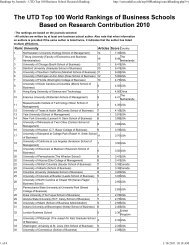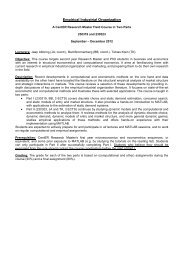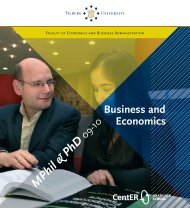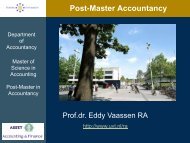Predicting the past - Tilburg University, The Netherlands
Predicting the past - Tilburg University, The Netherlands
Predicting the past - Tilburg University, The Netherlands
Create successful ePaper yourself
Turn your PDF publications into a flip-book with our unique Google optimized e-Paper software.
Methodology<br />
You probably know <strong>the</strong> Ten Commandments, or at least some of <strong>the</strong>m. In many disciplines<br />
leading scientists have compiled <strong>the</strong> ten commandments of <strong>the</strong>ir discipline, attempting to<br />
formalize <strong>the</strong> most important rules that need to be obeyed.<br />
We also have <strong>the</strong> ‘ten commandments of econometrics,’ compiled by Peter Kennedy in<br />
2002. I was asked to comment on <strong>the</strong>se commandments, which I did. But before doing<br />
so I asked myself why <strong>the</strong>re are two tablets of stone? Surely, God could have written<br />
all ten commandments on one tablet, especially since <strong>the</strong> tablets were written on both<br />
sides (Exodus, 32:15). Personally, I like <strong>the</strong> following explanation, which offends almost<br />
everybody, an added bonus.<br />
After having written <strong>the</strong> commandments, God wonders what to do with <strong>the</strong>m. He<br />
first turns to <strong>the</strong> British, who look at <strong>the</strong> commandments and say: ‘Ah, we are not<br />
allowed to lie? This is not for us.’ Next, he turns to <strong>the</strong> Germans, who say: ‘Ach,<br />
no killing? Sorry, but no.’ <strong>The</strong>n, he tries <strong>the</strong> French: ‘Oh, we can’t sleep with o<strong>the</strong>r<br />
women?’ Finally, God turns to <strong>the</strong> people of Israel, who ask: ‘What does it cost?’<br />
‘Nothing,’ says God. ‘<strong>The</strong>n, give us two!’<br />
<strong>The</strong> econometric commandments formulated by Peter Kennedy are all concerned with<br />
methodology and relate to <strong>the</strong> question: how should I do econometrics? I followed <strong>the</strong><br />
literature on methodology and participated in workshops, but my thoughts were confused<br />
until I started to work with Mary Morgan. This was in 1995, surprisingly late considering<br />
<strong>the</strong> fact that Mary and her husband Charles had been friends of ours since I started at<br />
<strong>the</strong> LSE in 1981. Mary and I organized an exciting experiment, where we gave a number<br />
of leading researchers or research groups one data set, fully documented, and a series<br />
of questions. <strong>The</strong>y had to answer <strong>the</strong> questions while using only <strong>the</strong> data provided by us.<br />
<strong>The</strong>y could however use <strong>the</strong>ir own models and methodology. After one year — I had <strong>the</strong>n<br />
moved from LSE to <strong>Tilburg</strong> — we all came toge<strong>the</strong>r for a workshop, here in <strong>Tilburg</strong>. Each<br />
group presented its findings and we tried to figure out why some results were close to<br />
each o<strong>the</strong>r, while o<strong>the</strong>r results were far apart. We were perhaps not completely successful<br />
in obtaining <strong>the</strong> answers. I expect that most groups went home thinking that <strong>the</strong>ir results<br />
were of course <strong>the</strong> best and that <strong>the</strong> o<strong>the</strong>rs were incompetent fools. But Mary and I did<br />
not think that any of <strong>the</strong>m were fools, and we used <strong>the</strong> material for a book, published in<br />
1999, that is still close to my heart.<br />
10 <strong>Predicting</strong> <strong>the</strong> <strong>past</strong>


